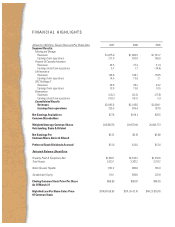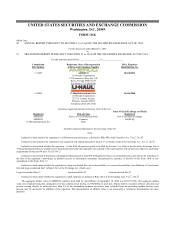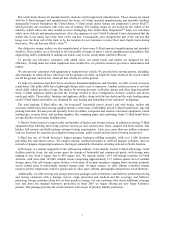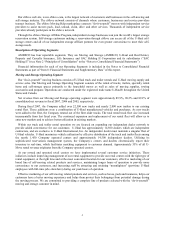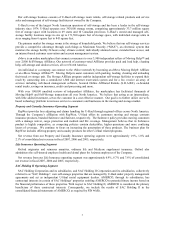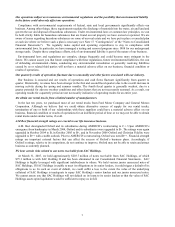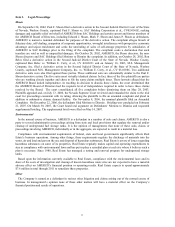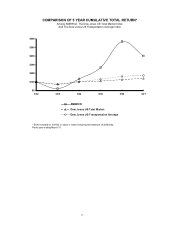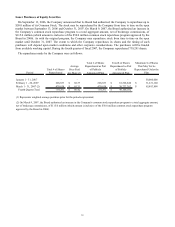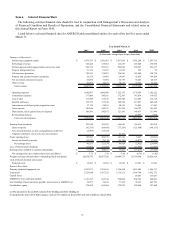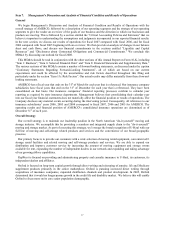U-Haul 2007 Annual Report Download - page 14
Download and view the complete annual report
Please find page 14 of the 2007 U-Haul annual report below. You can navigate through the pages in the report by either clicking on the pages listed below, or by using the keyword search tool below to find specific information within the annual report. 8
W
well, we may lose rental volume, which
w
raise rental sales and require us to offer discounted rates that would have a material affect on
op
annot assure you that we will be able to
w markets.
W
tstanding common shares of AMERCO are
he
, aside
from the President, be determined by a majority of the independent directors or the compensation committee.
e operate in a highly competitive industry.
The truck rental industry is highly competitive and includes a number of significant national, regional and local
competitors. Competition is generally based on convenience of rental locations, availability of quality rental moving
equipment, breadth of essential services and price. Financial results for the Company can be adversely impacted by
aggressive pricing from our competitors. In our truck rental business, our primary competitors are AvisBudget
Group and Penske Truck Leasing. Some of our competitors may have greater financial resources than we have. We
can not assure you that we will be able to maintain existing rental prices or implement price increases. Moreover, if
our competitors reduce prices and we are not able or willing to do so as
ould likely have a materially adverse affect on our results of operations.
The self-storage industry is large and highly fragmented. We believe the principle competitive factors in this
industry are convenience of storage rental locations, cleanliness, security and price. Some of our primary
competitors in the self-storage market are Public Storage, Inc., Extra Space Storage, Inc., and Sovran Self-Storage
Inc. Competition in the market areas in which we operate is significant and affects the occupancy levels, rental sales
and operating expenses of our facilities. Competition might cause us to experience a decrease in occupancy levels,
limit our ability to
erating results.
Entry into the self-storage business through acquisition of existing facilities is possible for persons or institutions
with the required initial capital. Development of new self-storage facilities is more difficult however, due to land
use, environmental and other regulatory requirements. The self-storage industry has in the past experienced
overbuilding in response to perceived increases in demand. We c
successfully compete in existing markets or expand into ne
e are controlled by a small contingent of stockholders.
As of March 31, 2007, Edward J. Shoen, Chairman of the Board of Directors and President of AMERCO, James
P. Shoen, a director of AMERCO, and Mark V. Shoen, an executive officer of AMERCO, collectively are the
owners of 8,967,863 shares (approximately 43.6%) of the outstanding common shares of AMERCO. In addition, on
June 30, 2006, Edward J. Shoen, James P. Shoen, Mark V. Shoen, Rosmarie T. Donovan (Trustee of the Shoen
Irrevocable Trusts) and Southwest Fiduciary, Inc. (Trustee of the Irrevocable “C” Trusts) (collectively, the
“Reporting Persons”) entered into a Stockholder Agreement in which the Reporting Persons agreed to vote as one
block in a manner consistent with the Stockholder Agreement and in furtherance of their interests. As of March 1,
2007, Adagio Trust Company replaced Southwest Fiduciary, Inc. as the trustee of the Irrevocable “C” Trusts, and
became a signatory to the Stockholder Agreement that was entered into by the other Reporting Persons on June 30,
2006. Pursuant to the Stockholder Agreement, the Reporting Persons appointed James P. Shoen as proxy to vote
their collective 10,642,588 shares (approximately 51.8%) of the Company’ s common stock as provided for in the
agreement. For additional information, see the Schedule 13D’ s filed on July 13, 2006 and on March 9, 2007 with
the SEC. In addition, 1,897,670 shares (approximately 9.2%) of the ou
ld by our Employee Savings and Employee Stock Ownership Trust.
As a result of their stock ownership and the Stockholder Agreement, Edward J. Shoen, Mark V. Shoen and James
P. Shoen will be in a position to significantly influence the business affairs and policies of the Company, including
the approval of significant transactions, the election of the members of the Board of Directors and other matters
submitted to our stockholders. There can be no assurance that the interests of the Reporting Persons will not conflict
with the interest of our other stockholders. Furthermore, as a result of the Reporting Persons’ voting power, the
Company is a “controlled company” as defined in the Nasdaq listing rules and, therefore, may avail itself of certain
exemptions under Nasdaq Marketplace Rules, including rules that require the Company to have (i) a majority of
independent directors on the Board; (ii) a compensation committee composed solely of independent directors; (iii) a
nominating committee composed solely of independent directors; (iv) compensation of our executive officers
determined by a majority of the independent directors or a compensation committee composed solely of independent
directors; and (v) director nominees selected, or recommended for the Board’ s selection, either by a majority of the
independent directors or a nominating committee composed solely of independent directors. The Company currently
exercises its right to an exemption from the Nasdaq rule requiring compensation of other executive officers


